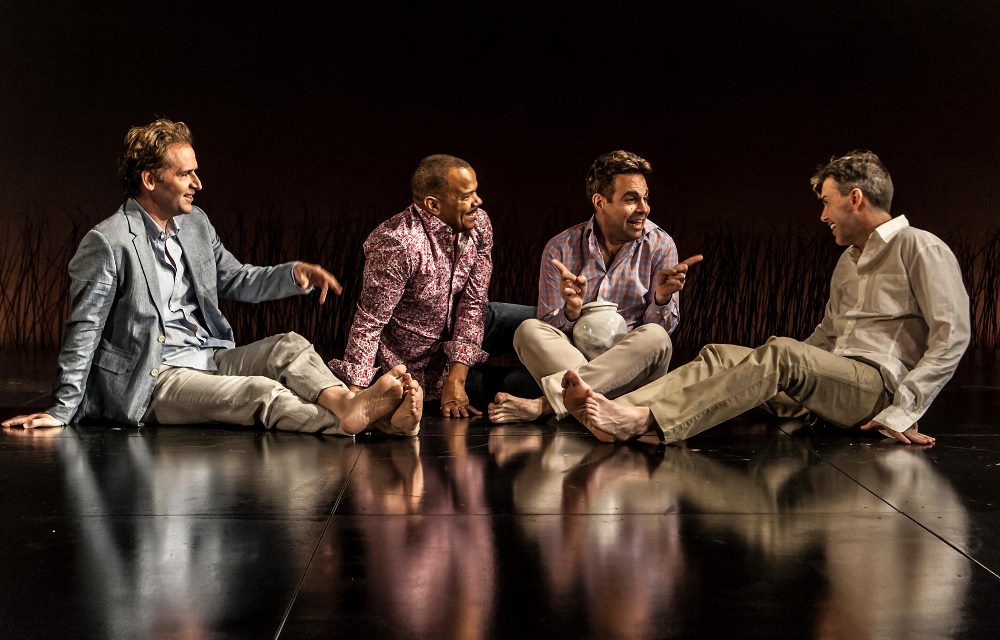Cynthia Nixon may be best known for playing Miranda on the series “Sex and the City” (and its film spinoffs), but she’s been acting since she was 12, making her Broadway debut in the 1980 revival of The Philadelphia Story. Other Broadway credits include the The Real Thing (both 1984 and 2014), Angels in America (1993), Rabbit Hole (2006), and Wit (2012). This month, the Tony-winning performer is directing Steve by Mark Gerrard at The New Group in New York City, about a gay Broadway chorus boy turned stay-at-home dad going through a mid-life crisis. The play runs Nov. 3–Dec. 27.
Below, Nixon discusses the differences between directing and acting, and the value of taking risks.
There are several theatre references in Gerrard’s script, especially Sondheim. Who’s your go-to playwright to reference in life?
In general, like when I’m talking to my oldest kid, Samantha, who’s also a theatre fanatic, I would say Shakespeare, ’cause Shakespeare gets it so right, and because it’s hundreds of years ago, these character types recur.
How old was Sam when you took her to the theatre?
My mother took me to Shakespeare when I was 5; I think Sam even went before that—I’d say 4 years old. We went to a production of As You Like It. And it’s one of my proudest moments! I was riding the subway with Sam at Union Square and I said, “Okay, Sam, Union Square!” And Sam said, “The night that Goldman spoke” [from Ragtime]. This is the kind of steeping in musical comedy, like the characters in [Steve], that’s so true to my life.
You made your directorial debut with the New Group’s Rasheeda Speaking last year. Do you see yourself directing more now instead of acting?
Oh, I really have no idea! I just know that I love it. I’m also very lucky that I’ve directed two plays I’m really crazy about. You can act in something and it can be not too great and it’ll be okay. If you direct something, it would probably be much harder to not be in love with it, because first of all, you work on it for a really long time, and you feel responsible for it. When you’re directing something, you really have to love it.
What work attracts you as a director?
One thing the plays I’ve directed have in common is they’re not about young people. They’re about people in middle age and dealing with big, grown-up issues. I’m going to be 50 next year, and I feel so interested in what that means to not only be over 40, which is one thing, but 50 is a whole other thing.
Most of the characters in Steve are having a mid-life crisis, which has to do with, “Wow, I’m closer to the end than to the beginning, and is the path that I’m on the right path for me? And if it’s not, what am I going to do about it? Am I going to take my life and tear it all up and start again? Or what changes am I going to make?” And I think those are really, really big questions and they’re complicated, and for me they’re endlessly fascinating.

Is that kind of midlife question why you’ve been drawn to this second career?
I don’t know. I think I’ve always had a bit of a love/hate relationship with taking risk. I don’t feel that I’m a risk-taker. But one thing that I crave as I get older is being able to take more risks, and not do only things that I already know how to do. I don’t know how to direct, but I’ve been in enough rooms with enough directors—I’ve been acting for like 37 years, a long, long time, and I’ve worked with some great directors. In some ways, it’s like watching your parents for so many years and all of a sudden, I’m qualified enough to be a parent now—or at least I’m qualified enough to try.
Do you have any guilty pleasures?
I would say my guilty pleasure is just sitting in a restaurant and being served. Because when you get to be my age, when you have three kids, you have made a lot of meals and you continue to make a lot of meals. There’s something so nourishing on every level about going to a restaurant where people will wait on you, and you can sit and you can relax and when you walk out of there, not only have you caught up either with a friend or your work, but you’re not hungry anymore.
What’s the secret to a long life in the theatre?
One of them is living in a town that values theatre. For me it’s New York, but it could be a lot of places: It could be Chicago, it could be Seattle, it could be Denver, it could be Minneapolis. In order to have a long life in the theatre, I think any serious theatre practitioner is also a theatregoer; you can’t have one without the other. In order to do either of those things, you have to live in a place where they value theatre.
I would say also not to just go to the same-old-same-old stuff you’ve always gone to. Theatre is such a big tent, and there’s so much, from the most commercial to the most avant-garde. Go to a new theatre company. Go to a place you’ve never heard of. And find those people—whether they’re actors, directors, or playwrights—whose work you really connect with. And then try and work with those people, or at least try and see everything they do. When you feel the connection, it feeds you in ways you’re conscious of, and it feeds you in a million ways you’re unconscious of.


